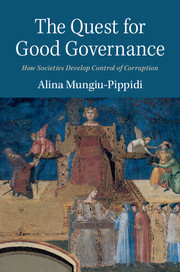Description
The Quest for Good Governance
How Societies Develop Control of Corruption
Author: Mungiu-Pippidi Alina
A passionate examination of why international anti-corruption fails to deliver results and how we should understand and build good governance.
Language: English
Subject for The Quest for Good Governance:
Approximative price 31.58 €
In Print (Delivery period: 14 days).
Add to cart
The Quest for Good Governance
Publication date: 08-2015
Support: Print on demand
Publication date: 08-2015
Support: Print on demand
Approximative price 96.56 €
In Print (Delivery period: 14 days).
Add to cart
The Quest for Good Governance
Publication date: 08-2015
Support: Print on demand
Publication date: 08-2015
Support: Print on demand
Description
/li>Contents
/li>Biography
/li>
Why do some societies manage to control corruption so that it manifests itself only occasionally, while other societies remain systemically corrupt? This book is about how societies reach that point when integrity becomes the norm and corruption the exception in regard to how public affairs are run and public resources are allocated. It primarily asks what lessons we have learned from historical and contemporary experiences in developing corruption control, which can aid policy-makers and civil societies in steering and expediting this process. Few states now remain without either an anticorruption agency or an Ombudsman, yet no statistical evidence can be found that they actually induce progress. Using both historical and contemporary studies and easy to understand statistics, Alina Mungiu-Pippidi looks at how to diagnose, measure and change governance so that those entrusted with power and authority manage to defend public resources.
1. Understanding control of corruption; 2. Diagnosis and measurement; 3. The road to Denmark: historical paths to corruption control; 4. Structure and agency: determining control of corruption; 5. Understanding contemporary achievers; 6. Domestic collective action capacity; 7. International agency and its anticorruption impact; 8. From critical mess to critical mass: some tentative policy conclusions.
Alina Mungiu-Pippidi teaches democratization and policy analysis at the Hertie School of Governance in Berlin. She chairs the European Research Centre for Anti-Corruption and State Building Research and is Chair of Policy Pillar of the EU FP7 five-year research project, ANTICORRP. Professor Mungiu-Pippidi has served as an adviser on issues of governance measurement and anticorruption to the European Commission, UNDP, Freedom House, NORAD and the World Bank, among others. She is also a popular op-ed writer and the author of two film documentaries: 'Where Europe Ends' and 'A Tale of Two Villages,' screened by the BBC.
© 2024 LAVOISIER S.A.S.




